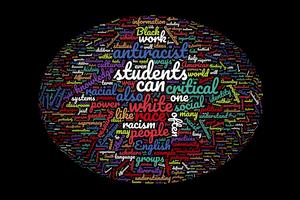Research
AU Launches Anti-Racist Pedagogy Library Subject Guide Unveiled at AU’s first virtual Anti-Racist Teach-In

Yesterday, American University launched its very first Anti-Racist Pedagogy Library Subject Guide. Its official name is the Antiracist Praxis, and it gives the entire AU community easy access to the main ideas, key terms, and definitions within the scholarship thats inform antiracist practice, particularly as they relate to composition pedagogy and library and information science.
The guide, which can be accessed on the American University Library website, is a living document that will be continually updated with new content. The “big idea” behind the guide is the importance of defining things clearly, says Sarah Trembath, professorial lecturer of literature and co-chair of the information literacy committee that developed the guide. This enables the AU community to have a common understanding of important topics under discussion.
“Similarly, naming complex historical, educational, psychoemotional, and other factors makes them more real to people. It makes those things easier to discuss and easier to solve,” Trembath explains. “For instance, if one believes, ‘it’s important to reverse the effects of the race-class power hierarchies set up during the age of exploration, conquest, and colonization,’ one should know that is a ‘decolonial’ ethic. Knowing that term, one can conduct research on it, learn what decolonial thinkers are saying and doing, and be a part of the solution much more easily than if one didn’t have a term for the idea or ethic.”
Developing the guide was an ambitious undertaking. It was written by members of the Writing Studies/Information Literacy committee, a joint committee between the Writing Studies Program and the Library. It was made possible by an Inclusive Excellence Collaboration mini-grant through the President’s Council on Diversity and Inclusion.
A Launch and a Teach-In
To celebrate the official praxis release yesterday, the committee held a virtual Anti-Racist Teach-In, which was attended by 76 faculty and staff members from across the university. Attendees received an official introduction to the Antiracist Praxis and an invitation to use it and recommend it to their students. “We want you to be current in the field of antiracist work,” said Trembath.
Attendees then broke into small discussion groups to discuss relevant topic in antiracist work, ranging from implicit bias, to intersectionality, to decentering whiteness. Trembath asked each individual to make a commitment to making antiracist work actionable —to move the conversation about race from a confessional mode to an actionable one.
“We want you to leave today with something you can change about your praxis,” she said, “We want you to think of just one or two very small things that you can do differently going forward.”
Each subgroup was asked to report back to the larger group. From big ideas to small, the debrief ideas were actionable both inside and outside the classroom. Examples include:
- Identify your own biases
- Don’t make judgements about students based on names, roster, seating arrangements
- Let students pronounce their own names first to avoid mispronunciation
- Recognize and name the ways white supremacy is present in our knowledge systems
- Recognize that students have knowledge, examine what stories are priviledged, and make space
- Bring outside events from the real world into our teaching
- Model listening heuristics to foster collaboration. Follow up questions.
- Think about how identify manifests, eg: military, geographic, beyond race, gender, and sexuality).
Contributors to the Antiracist Praxis
- Sarah Trembath (co-chair), Writing Studies Program
- Hannah Park (co-chair), Library
- Maddox Pennington (incoming co-chair), Writing Studies Program
- Rachel Borchardt, Library
- Symphony Bruce, Library
- Christina Bush, Library
- Zainab Cheema, Writing Studies Program
- Nikhat Ghouse, Library
- Jay Hardee, Writing Studies Program
- Olivia Ivey, Library
- Derrick Jefferson, Library
- George Koors, Library and Writing Studies Program
- Susan Mockler, Writing Studies Program
- Marnie Twigg, Writing Studies Program
- Special thanks to Katie Hut, Reference Librarian, for her help in formatting the citations in the guide.
The guide is available on the AU Library website.
